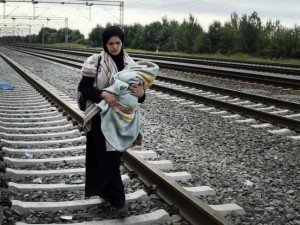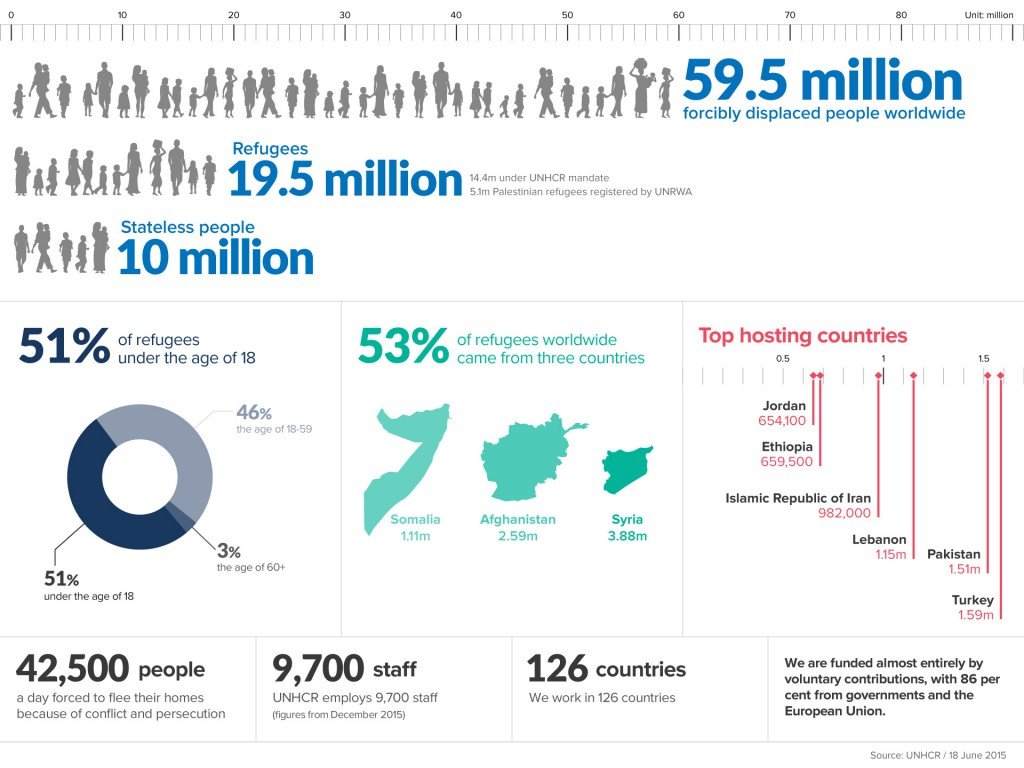World Refugee Day 2016: PEN Re-iterates its Call for Greater Protection for Refugees and Migrants
20 June is World Refugee Day. As the world faces the worst refugee crisis since the end of World War II, what’s becoming increasingly clear is that world’s system for protecting refugees is not working, it is broken. The numbers seeking refuge globally are staggering, and dehumanising. According to the UNHCR, an estimated 60 million people are forcibly displaced – either internally or seeking refuge abroad – due to conflict, crises or persecution. Many risk and lose their lives making dangerous and illegal journeys in search of safety and security. At least 2,510 refugees and migrants drowned between January and May 2016 during their attempts to cross to Europe.
Worldwide, 19.5 million people have been forced to seek sanctuary abroad, more than half of those are children. Many are escaping conflict in Iraq, Afghanistan and Syria, where at least 250,000 have been killed, well over one million have been wounded and more than 50 per cent of the population have been displaced. 86 per cent of the world’s refugees are hosted by the world’s developing countries - mainly Middle Eastern, African and South Asian countries.
One in every two of those crossing the Mediterranean this year – half a million people – were Syrians escaping the conflict in their country. Among those escaping are writers and journalists. At least 90 journalists and writers have been killed, while many others have been arbitrarily detained, tortured or have disappeared, making Syria one of the most dangerous countries in the world for writers and journalists, as demonstrated in PEN’s annual Case List.
PEN International has been working at a grassroots level to protect, shelter and resettle writers at risk globally since World War II. Solidarity actions to support individual writers at risk have been the core of PEN’s free expression work historically, and the impact can be life-enhancing, life-changing and even life-saving.
In April 2015, moved by the deaths of migrants and refugees in the Mediterranean, a delegation of PEN members met with the President of the European Parliament, Martin Schulz, to present a petition signed by over a thousand writers asking European member states to meet their humanitarian obligations to protect refugees through common, humane asylum laws. The proposals of the delegation were warmly welcomed by the European Parliament. Over a year later, Europe has witnessed the greatest humanitarian crisis since World War II as hundreds of thousands of people fleeing persecution and war in Asia, Africa and the Middle East have risked their lives in an attempt to reach safety and protection. Rather than prioritising saving lives, European Union governments have focused on preventing departures.
In March, the EU finalised a deal with Turkey to significantly reduce the number of Syrian and other asylum seekers reaching the EU. Many elements of this deal represent a disturbing disregard for international law covering the rights of refugees, asylum seekers, and migrants. The agreement stipulates that all asylum seekers are to be “returned” to Turkey, which had been deemed a “third-safe country of residence”, supposedly in full accordance with EU and international law.
However, conditions in Turkey are far from the standards of protection to guard against the non-refoulement rule of international law which prohibits forcing people back to places, including by rejecting them at the border, where their lives or freedom would be threatened. According to the UNHCR, 91 per cent of the sea arrivals to Greece in 2015, and thus far in 2016, come from the top ten refugee-producing countries in the world. These facts clearly undermine any assumption that people arriving by boat in Greece do not need international protection.
PEN is also deeply concerned that the EU is willing to turn a blind eye as Turkey’s president oversees an unprecedented crackdown on human rights and freedoms in the interests of securing the Joint Action Plan. The EU has been muted in any criticism concerning the near elimination of critical media and the escalating conflict in the Southeast over the past few months. For the EU at such a moment to diminish its support for a rights-respecting Turkey dramatically transforms the terms of the EU-Turkey relationship and may even contribute to Turkey’s authoritarian slide.
Turkey’s once open door with Syria is now a concrete wall and razor-wire where Turkish border guards are shooting and beating Syrian civilians trying to escape the violence. As refugees are prevented from leaving Turkey, they are now turning to the Libyan border to try to cross the Mediterranean. In just one week at the end of May 2016, it is thought that over 880 people leaving Libya in rickety boats for Europe drowned. It is feared many more will drown as the number of crossings tends to dramatically increases over the summer months.
The crisis is by no means confined to Europe. Across the globe from Central America to the Central African Republic to Rakhine State in Myanmar people are fleeing conflict and persecution. At the same time, the right to asylum guaranteed in international law is under threat as states aim to prevent people at risk from reaching their borders and claiming that asylum. Elsewhere, countries like Kenya are threatening to close their refugee camp, effectively depriving hundreds of thousands of people protection. Meanwhile across Europe, Australia and the United States, there has been a marked surge in hostility towards those seeking protection. From right-wing violence to clashes with border guards to mass detentions of vulnerable people in squalid camps, men, women and children are being treated in a profoundly inhumane manner. And as governments move to destroy refugee camps, freedom of expression and the press is also coming under attack. In Greece, the authorities’ move to ban most journalists from covering its military operation to move thousands of refugees from Idomeni camp on in late May, is a blatant violation of freedom of expression and part of worrying trend of censorship.
Around the world, people have demonstrated extraordinary solidarity with asylum seeking families as they make their journeys across the continent. Yet European and global institutions and governments have remained divided, chaotic and ineffective in their response to this humanitarian crisis. A very different approach - based on human rights and compassion – is needed.
The lack of legal routes to find safety in countries with resources to host them remains at the heart of this problem. Thousands of refugee parents are risking the lives of their children on unsafe smuggling boats primarily because they have no other choice.
European countries – as well as governments in other regions, especially North America and the Gulf States – must establish sufficient safe and legal channels to protection, and make some fundamental changes to allow for larger resettlement and humanitarian responses. PEN’s expanding programme of protection work with writers at risk demonstrates the need for expanded visa and sponsorship programmes, scholarships and other ways for persecuted writers to enter other countries legally.
Furthermore, family reunification must become an accessible option for many more people than is currently the case. While border security should be recognised as necessary for national security this must not put the lives of refugees in danger. The deaths of refugees should be neither legitimised nor tolerated in the name of protecting borders. The protection of human life must have the highest priority. Governments must take measures to temper the fears of their citizens and decrease the risks of xenophobia. This is a defining moment for the world and we have no other choice but to mobilize fully around this crisis.
PEN calls on the EU and all governments to reform existing policies to:
Substantially increase the number of refugee resettlement spaces;
Develop refugee determination processes that are timely, fair and treat every claimant with dignity;
Refrain from violent policies and practices that aim to deter or prevent people from crossing their borders;
Provide more funding to support countries hosting the largest numbers of refugees fleeing conflicts;
Call on refugee-hosting communities and governments to facilitate access to basic social services for asylum seekers and refugees;
Take all possible measures to combat xenophobia and anti-refugee sentiment;
Address the inadequacy of legislation to deal humanely with individuals caught in crisis.


